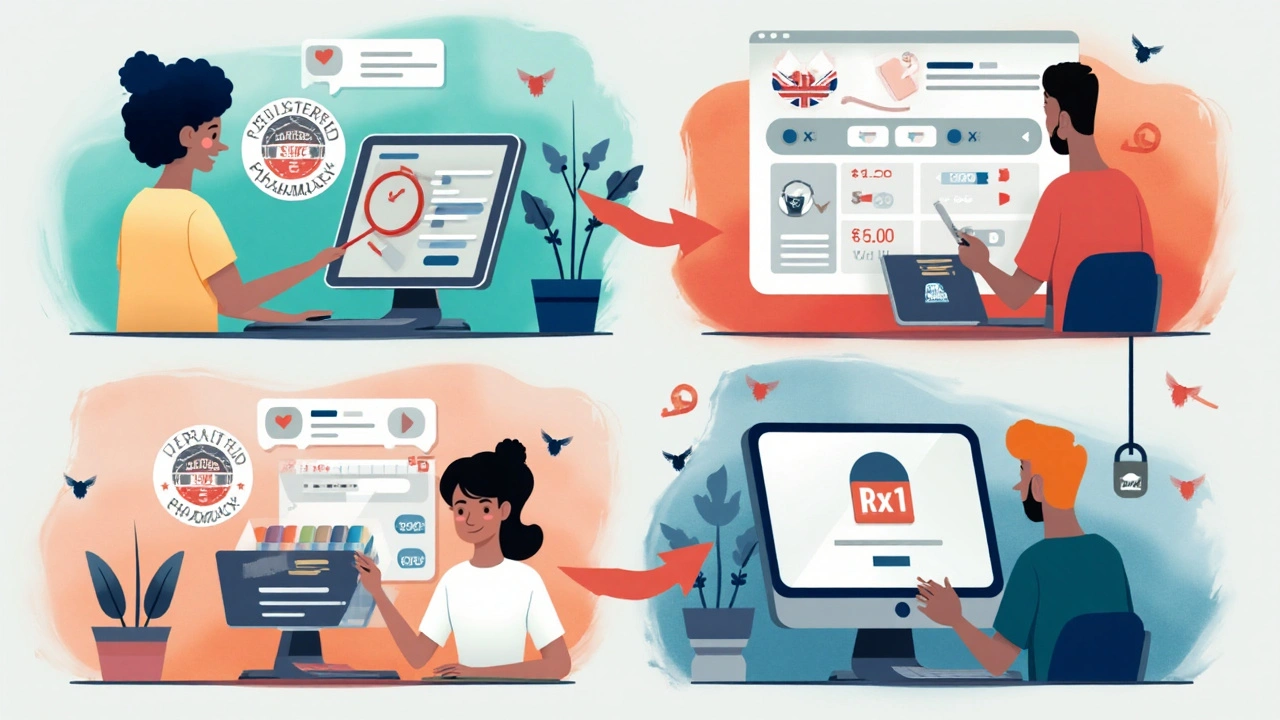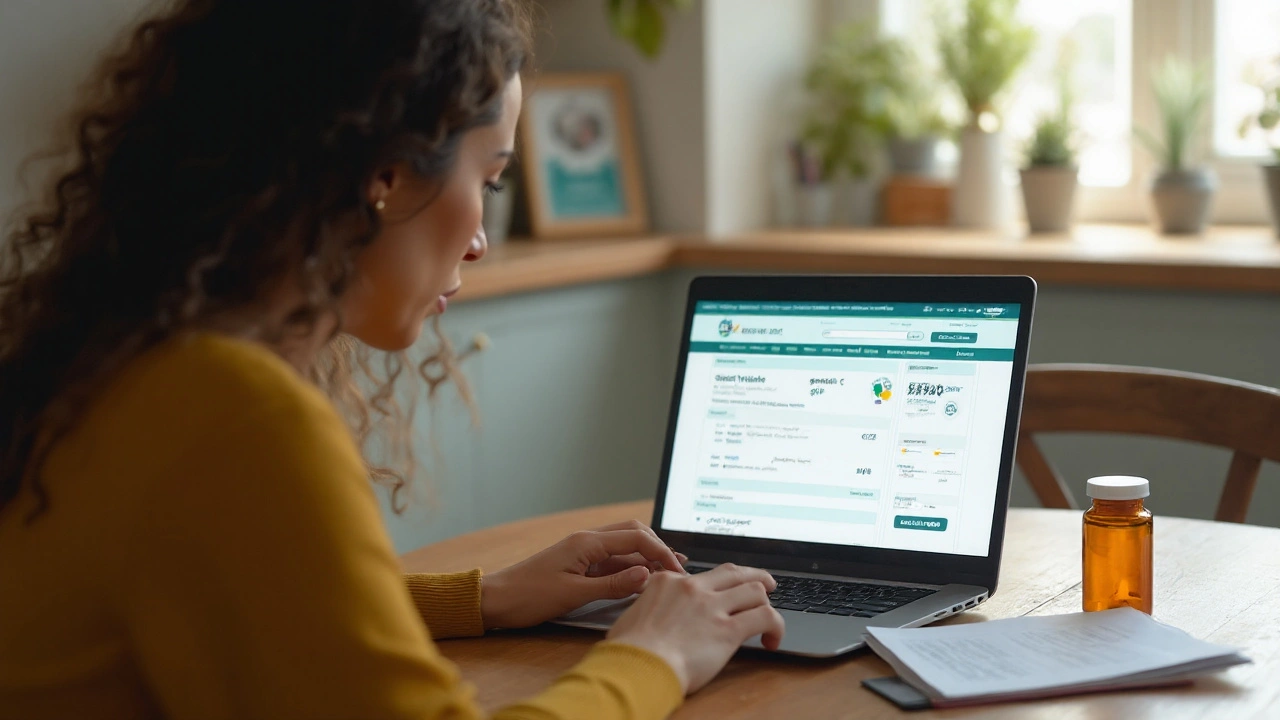You want a safe, legal way to get generic Depakote without blowing your budget. You also don’t want to mess around with shady pharmacies or fall foul of UK rules. Here’s the honest, practical guide I wish everyone saw before they hit “checkout.” I’m in Nottingham, and I’ve bought repeat prescriptions both in-person and online. The short version: you can get it affordably, but you must do it the right way.
What you likely need to get done today:
- Find legitimate places to buy Depakote online (generic: divalproex/valproate) in the UK.
- See real-world prices and how to cut the cost.
- Understand UK rules, especially if pregnancy could be a factor.
- Reduce risks (side effects, interactions, switching issues).
- Know when generic “Depakote” equals sodium valproate or MR/ER tablets here.
- Walk away with a clear, legal next step you can do today.
Safe ways to buy generic Depakote online in the UK (what’s legal in 2025)
First, a quick naming check. “Depakote” is a brand for divalproex sodium (valproate). In the UK, you’ll often see “sodium valproate,” “valproate semisodium,” or brand names like Epilim. Modified-release (MR) or prolonged-/extended-release tablets are common here. Functionally, they’re valproate. Your clinician will tell you the exact formulation you’re on.
Now the rule that matters: valproate is prescription-only in the UK. Any online pharmacy that offers it without a prescription is not legitimate. Full stop. You want a General Pharmaceutical Council (GPhC) registered pharmacy and, for UK sellers, the MHRA’s distance-selling logo. If they don’t require a prescription or a proper online consultation, walk away.
How to do this safely, step by step:
- Check the pharmacy’s registration: find the GPhC registration number in the website footer and verify it on the GPhC register (search “GPhC register”). Look for the MHRA distance-selling logo and click it to confirm it’s genuine.
- Pick your route:
- NHS prescription: cheapest for most people. In England, you pay the standard prescription charge per item (about £9.90 at the time of writing); prescriptions are free in Scotland, Wales, Northern Ireland.
- Private online doctor + pharmacy: usually asks a clinical questionnaire, may request ID, and issues a private prescription if appropriate. Good if you can’t get to your GP, but you’ll pay for the prescription + meds + delivery.
- Confirm the exact product: match what you currently take-form (MR/ER vs immediate/delayed release), strength (e.g., 250 mg or 500 mg), and brand/manufacturer if advised to stay consistent.
- Upload/enter your prescription details: NHS electronic prescriptions can be sent to an online pharmacy. Private online doctors will forward one internally if they approve treatment.
- Complete pharmacist checks: expect a pharmacist to message you if anything’s unclear-dose, interactions, pregnancy prevention, or monitoring. That’s a good sign, not a hassle.
- Choose delivery: standard is often 2-4 working days in England. If you’re in a city like Nottingham, next-day options are common, but order early to avoid gaps in dosing.
Quick legitimacy checklist you can run in 60 seconds:
- GPhC number is visible and verifiable.
- MHRA distance-selling logo is present and clickable.
- They ask for a prescription or provide a proper online medical assessment.
- There’s a named superintendent pharmacist and a UK-registered premises.
- Real customer support with pharmacist access (chat/email). No wild claims like “no prescription needed.”
Ethical tip: if a website sells valproate without a prescription, it’s not “convenient”-it’s dangerous. Besides legal risk, you are gambling with a medicine that carries serious warnings for liver toxicity, pancreatitis, and birth defects. Trust the friction; it’s there to keep you safe.
Women and girls who could become pregnant: the UK’s Valproate Pregnancy Prevention Programme (PPP) applies. You’ll need a specialist review, a signed risk acknowledgement form, and reliable contraception. Any legitimate UK provider will enforce this. If a site doesn’t, that’s a red flag.
Clear, safe next step: choose a GPhC-registered pharmacy that takes NHS e-prescriptions if you have one; if you don’t, book a GP appointment or use a reputable online doctor service that will review your case against UK guidance. Keep your brand/formulation consistent unless your clinician advises a change.

Prices, savings, and the trade-offs (UK 2025)
Let’s talk money without the fluff. In England, the standard NHS prescription charge per item is about £9.90. That covers the cost of the medicine regardless of the pharmacy’s wholesale price. If you regularly get more than one prescription a month, an NHS Prescription Prepayment Certificate (PPC) can cut costs a lot-think roughly £32 for 3 months or around £115 for 12 months. Scotland, Wales, and Northern Ireland don’t charge for prescriptions.
On private online routes, pricing varies with formulation and pack size. Modified-release (MR/ER) tablets in 500 mg are common and may come in 28, 30, or 56 packs. Expect to see a private consultation or prescription fee on top, plus delivery. The upside is convenience and speed; the downside is total cost.
Here’s a practical comparison so you can map your next order:
| Route | Typical total cost for 28 × 500 mg MR | Prescription needed? | Delivery time | Notes |
|---|---|---|---|---|
| NHS prescription (England) | ~£9.90 per item (PPC may reduce effective cost) | Yes (GP/specialist) | 1-4 working days via online/NHS pharmacy | Cheapest for most; PPP rules apply if relevant |
| Private online doctor + UK pharmacy | Medication price varies + consult/prescription fee + delivery (often £20-£60+ total) | Yes (issued after online review) | 1-3 working days; next-day often available | Convenient; pricier than NHS |
| Local brick‑and‑mortar (NHS) | Same NHS charge; no delivery fee | Yes | Same day if in stock | Good if you need it today; call ahead for stock |
| “No‑Rx” overseas site | Looks cheap; hidden fees common | No (that’s the problem) | Unpredictable | Unsafe and illegal supply risks-avoid |
Ways to pay less without cutting corners:
- Use the NHS where you can, and get a PPC if you have 2+ items a month.
- Stick to the same formulation so you avoid “paying twice” due to switching mishaps (missed doses, side effects, emergency appointments).
- Ask your pharmacist if a larger pack (e.g., 56) is available with your prescription to reduce delivery fees over time.
- If you must go private, compare total cost, not just pill price: consultation + meds + delivery.
- Order 7-10 days before you run out. Express shipping is the most expensive “fee” most people pay.
About formulations and substitutions:
- MR/ER vs delayed-release: these aren’t identical. ER formulations often have slightly different absorption. Your prescriber will pick the one that suits your dosing schedule and blood level targets.
- Brand consistency: UK safety advice groups antiepileptics by switching risk. Valproate sits in the “use clinical judgement before switching” bucket. If you’re stable, many clinicians prefer keeping you on the same brand/manufacturer to avoid breakthrough symptoms. Ask your pharmacist to note this on your record.
- “Depakote” vs “sodium valproate”: in the UK, you may be supplied sodium valproate or valproate semisodium as the equivalent agent. Your prescriber can confirm if your indication and formulation match.
Typical private pricing patterns I see in 2025:
- 500 mg MR tablets: a 28-pack commonly sits in the £12-£28 range for the medicine alone at private online pharmacies, before any consultation fee. Prices shift with manufacturer and supply.
- 250 mg MR tablets: per‑mg costs are often higher than 500 mg. If your regimen allows it, the 500 mg strength can be more cost-effective-only change if your prescriber says it’s appropriate.
- Delivery: £3-£6 standard; £6-£10 for next‑day. Free tiers kick in at higher basket totals.
Three quick money rules of thumb:
- If you pay for 2+ prescriptions monthly in England, a PPC almost always saves you money.
- Emergency deliveries cost more than planning a week ahead.
- Switching brands to “save” pennies can cost pounds if it destabilises your condition. Stability first.

Risks, rules, and smarter alternatives (what to know before you hit buy)
Valproate is effective for epilepsy and for manic episodes in bipolar disorder, and it’s used for migraine prevention in some regions. But it’s not a casual medicine. UK safety regulators put serious guardrails around it.
Who should not take it without specialist oversight: anyone pregnant or trying to conceive. The MHRA’s Pregnancy Prevention Programme is crystal clear-valproate must not be used in pregnancy for epilepsy or bipolar unless no other treatment works. It carries a high risk of birth defects and developmental problems. If pregnancy is possible, expect extra steps: documented counselling, consent, reliable contraception, and regular specialist review.
Other notable risks you should actually plan around:
- Liver toxicity: highest risk in the first six months and in younger children, but adults aren’t exempt. Your clinician may check liver function before and during treatment.
- Pancreatitis: rare but serious-seek urgent help if you develop severe abdominal pain, nausea, or vomiting.
- Blood disorders: bruising or bleeding that’s unusual needs prompt attention.
- Weight gain, tremor, hair changes, and GI upset: common enough to plan for. Food and slow titration can help, but follow your clinician’s plan.
- Interactions: valproate can raise lamotrigine levels (rash risk), and carbapenem antibiotics can dramatically lower valproate levels. Always tell your pharmacist about every medicine you take, including OTC and herbal products.
Monitoring basics your team may use: liver function tests, full blood count, possibly serum valproate levels when indicated (for adherence, toxicity, pregnancy, or when changing formulation). If an online provider never asks about this, that’s not convenience-it’s a warning sign.
Switching and supply hiccups:
- Out of stock? Ask for the same formulation from a different manufacturer first. If none is available, you may need a prescriber review to change formulation or dose timing.
- Side effects after a manufacturer switch? Record the batch/manufacturer, contact the pharmacy, and speak to your prescriber. Don’t stop suddenly unless told-abrupt withdrawal risks seizures or mood relapse.
- Traveling? Carry extra tablets, a copy of your prescription, and keep meds in original packaging for customs. Time-zone changes may require dose timing advice from your pharmacist or clinician.
Closest alternatives if valproate isn’t right for you (discussion points for your prescriber, not DIY swaps):
- Epilepsy: levetiracetam, lamotrigine, carbamazepine, and others depending on seizure type and your profile.
- Bipolar mania: lithium, atypical antipsychotics (e.g., quetiapine), or other mood stabilisers guided by NICE recommendations and your history.
- Migraine prevention: propranolol, topiramate, amitriptyline, CGRP-pathway options-depending on your case and UK commissioning rules.
Mini‑FAQ (the stuff people ask me most often):
- Can I buy generic Depakote without a prescription online in the UK? No. Legit pharmacies will require an NHS or private prescription. Sites that don’t are unsafe and likely illegal.
- Is “generic Depakote” the same as sodium valproate? Often yes in practice here, but the exact formulation matters (MR/ER vs delayed release). Stick with what your prescription specifies.
- Is it cheaper to get it in person? With NHS prescriptions, usually the cost is the same per item. Online saves time; in-person can be faster if it’s in stock.
- I’m stable on one brand-should I accept a different one? Speak to your prescriber/pharmacist. Many prefer brand/manufacturer consistency with valproate to avoid destabilisation.
- What about pregnancy? If pregnancy is possible, you must be under the PPP with specialist oversight before starting or continuing valproate.
- How do I know a pharmacy is legit? Verify the GPhC registration and MHRA logo, and ensure they require a prescription and offer pharmacist contact.
Next steps you can take today, depending on your situation:
- No current prescription: book your GP or specialist appointment. If that’s not possible soon, use a reputable UK online doctor service that follows NICE and MHRA guidance.
- Have an NHS prescription: nominate a GPhC-registered online pharmacy and send your e-prescription; consider a PPC if you pay for multiple items.
- Pregnancy possible: contact your prescriber now to review PPP requirements; do not order from any site that ignores these checks.
- Switching formulation or brand: don’t do this solo. Ask your prescriber first; dose equivalence isn’t always 1:1 between ER and other forms.
- New side effects or interactions: message the pharmacy’s pharmacist or your GP the same day; keep your batch info handy.
Credibility notes you can rely on when double-checking: The MHRA (Drug Safety Update) sets UK safety rules for valproate and the Pregnancy Prevention Programme. NICE publishes guidance on epilepsy and bipolar disorder management used by UK clinicians. The British National Formulary (BNF) has up-to-date dosing, interactions, and monitoring advice. The NHS Business Services Authority lists current prescription charges and PPC details. Ask your pharmacist to align your order with these standards-they will.
My take, after years of helping people navigate this: the cheapest route is almost always NHS with a PPC if you qualify. The safest route is a GPhC-registered pharmacy that insists on doing things by the book. Put those together and you get what you wanted at the top: a legal, affordable supply delivered to your door, without nasty surprises.

Tommy Walton
September 13, 2025 AT 11:42James Steele
September 13, 2025 AT 15:20Louise Girvan
September 15, 2025 AT 13:55soorya Raju
September 15, 2025 AT 23:45Grant Hurley
September 16, 2025 AT 12:56Shannon Gabrielle
September 17, 2025 AT 22:18ANN JACOBS
September 19, 2025 AT 08:09Nnaemeka Kingsley
September 20, 2025 AT 01:49Kshitij Shah
September 20, 2025 AT 10:20Sean McCarthy
September 21, 2025 AT 11:27Jaswinder Singh
September 22, 2025 AT 18:05Bee Floyd
September 24, 2025 AT 07:06Jeremy Butler
September 24, 2025 AT 19:32Courtney Co
September 25, 2025 AT 23:25Shashank Vira
September 27, 2025 AT 10:56Eric Vlach
September 29, 2025 AT 03:30Souvik Datta
September 30, 2025 AT 03:05Priyam Tomar
September 30, 2025 AT 17:38Jack Arscott
October 1, 2025 AT 04:55Irving Steinberg
October 2, 2025 AT 00:07